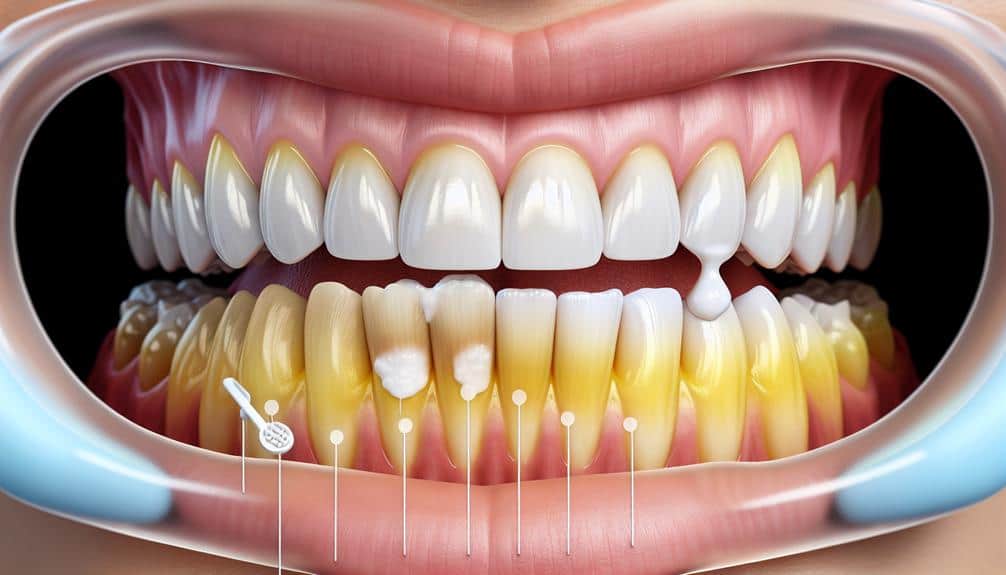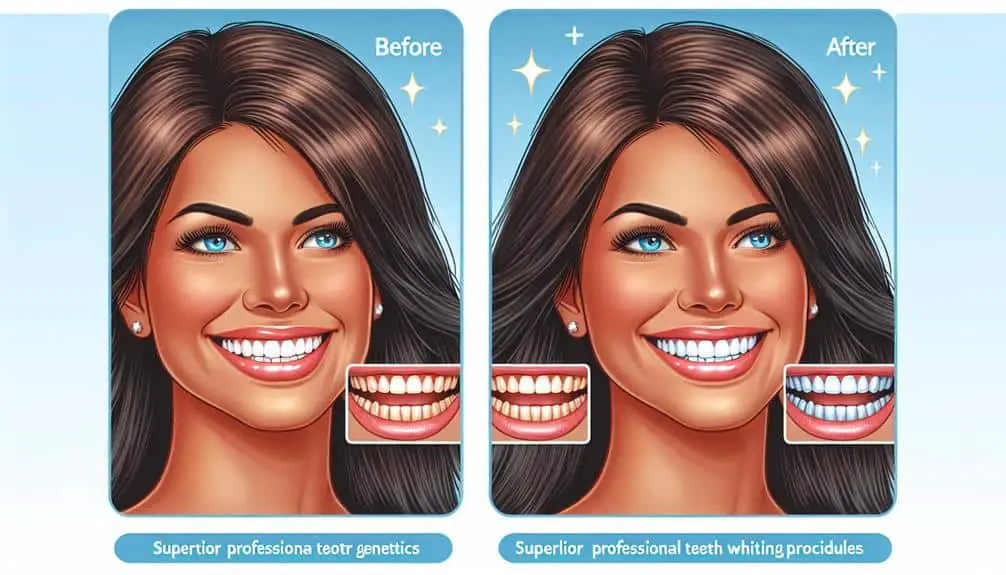Genetic tooth discoloration remedies work by targeting underlying genetic mechanisms that influence tooth color. These remedies modify genetic processes at the root of discoloration, providing a lasting solution. By addressing genetic factors, these remedies offer a permanent way to combat tooth discoloration effectively. To understand further how these remedies interact with genetic traits, explore the nuances of genetic tooth discoloration and how natural remedies can alter these genetic processes to achieve desired outcomes.
Key Points
- Remedies target genetic factors influencing enamel color.
- Natural bleaching properties address intrinsic discoloration.
- Genetic tooth discoloration remedies modify enamel formation.
- Home remedies work at the genetic level for lasting results.
- These remedies offer a permanent solution to genetic discoloration.
Understanding Genetic Tooth Discoloration
When considering genetic tooth discoloration, it's important to understand the underlying causes and mechanisms at play. Genetic factors play a significant role in determining an individual's dental health. These genetic predispositions can influence the color of your teeth, making them more prone to discoloration compared to others. Understanding the genetic basis of tooth discoloration is vital for developing effective remedies.
Genetic factors affecting tooth color can impact the thickness of the enamel, the density of dentin, and the overall mineralization of teeth. Variations in these genetic traits can lead to different shades of tooth color, affecting the appearance of your smile. It's important to note that genetic tooth discoloration isn't solely determined by external factors like diet or oral hygiene but also by intrinsic genetic characteristics.
Causes of Genetic Tooth Discoloration
Genetic tooth discoloration is primarily caused by variations in the genes responsible for enamel thickness, dentin density, and overall tooth mineralization. These genetic factors influence the color of your teeth and can lead to discoloration over time.
Here are some key points to take into account:
- Inherited Traits: Genetic tooth discoloration is often passed down through generations, making it a hereditary trait that can be observed in families.
- Genetics: The genes involved in enamel formation and mineralization play an essential role in determining the natural color of your teeth.
- Family History: Understanding your family's history of tooth discoloration can provide insights into your own risk factors and potential for genetic discoloration.
- Discoloration: Genetic variations can result in different levels of pigmentation or mineralization in the teeth, leading to discoloration that may be challenging to address through traditional whitening methods.
Benefits of Natural Remedies
Natural remedies offer potential benefits in addressing genetic tooth discoloration through their unique properties and mechanisms of action. When considering natural solutions for genetic tooth discoloration, home remedies stand out for their ability to potentially lighten teeth due to their natural bleaching properties. For instance, the use of baking soda, activated charcoal, or hydrogen peroxide in controlled concentrations may help reduce surface stains on the teeth, improving their overall appearance. These remedies work by either physically scrubbing away discoloration or chemically breaking down the compounds that cause staining.
Additionally, natural remedies often have fewer artificial additives compared to commercial whitening products, making them a potentially safer alternative for individuals with sensitive teeth or gums. Some natural solutions also possess antibacterial properties, which could aid in reducing plaque buildup and preventing further discoloration. While the effectiveness of these home remedies may vary from person to person, their gentle approach and potential benefits make them a worthwhile consideration for those seeking to address genetic tooth discoloration naturally.
Popular Remedies for Discoloration
Popular remedies for tooth discoloration encompass a diverse range of options that aim to address the issue effectively. When considering treatments for tooth discoloration, you may come across various popular remedies. Here are some common options:
- Herbal Treatments: Herbal remedies like using neem, aloe vera, or activated charcoal are often suggested for their potential to help whiten teeth naturally.
- DIY Whitening Kits: Do-it-yourself whitening kits, containing ingredients like hydrogen peroxide or baking soda, are popular choices for those looking to brighten their smile at home.
- Oil Pulling: This ancient practice involves swishing oil in your mouth to remove bacteria and stains. Coconut oil is a common choice for this method.
- Fruit-based Whitening: Some people opt for natural fruit acids like lemon or strawberries to help whiten teeth, although these methods should be used with caution due to their acidic nature.
Exploring these popular remedies can give you insights into different approaches to addressing tooth discoloration before considering more advanced treatments.
How Remedies Target Genetic Discoloration
One effective approach to combatting genetic tooth discoloration involves targeting specific mechanisms within the tooth structure. Genetic factors play a significant role in determining the color of your teeth, and remedies that specifically target discoloration at the genetic level can be highly effective. These remedies work by addressing the underlying genetic mechanisms that contribute to tooth discoloration, such as variations in enamel thickness or dentin structure.
By targeting discoloration through genetic factors, these remedies can produce long-lasting results that go beyond surface-level whitening treatments. They aim to modify the genetic processes that lead to discoloration, ultimately resulting in a more permanent solution to genetic tooth discoloration.
Understanding how remedies target genetic factors is important for developing effective treatments that address the root cause of tooth discoloration. By focusing on the genetic mechanisms responsible for discoloration, these remedies offer a targeted approach that can provide lasting improvements in the color and overall appearance of your teeth.
Frequently Asked Questions
Are Genetic Tooth Discoloration Remedies Safe for Pregnant Women?
Genetic tooth discoloration remedies should be approached with caution during pregnancy. Consult your dentist for safe dental procedures. Cosmetic dentistry may pose risks, so prioritize safety. Your health and your baby's well-being are paramount.
Can Genetic Tooth Discoloration Be Completely Reversed With Natural Remedies?
Like a skilled artist restoring a masterpiece, genetic tooth discoloration can be effectively reversed through a combination of dental procedures and diligent dental care. These remedies offer promising results when it comes to complete restoration.
Are There Any Specific Diets or Lifestyle Changes That Can Help Prevent Genetic Tooth Discoloration?
To prevent genetic tooth discoloration, focus on preventive measures. Incorporate dietary changes like reducing sugary foods and beverages. Practice good oral hygiene, visit your dentist regularly, and consider professional whitening treatments for effective management of tooth discoloration.
How Long Does It Typically Take to See Results From Using Natural Remedies for Genetic Tooth Discoloration?
When using natural remedies for genetic tooth discoloration, results timeline varies. Typically, noticeable changes may be seen within weeks. Satisfaction levels depend on individual response and adherence to treatment. Effectiveness markers include improved tooth color and overall oral health.
Are There Any Potential Side Effects or Risks Associated With Using Natural Remedies for Genetic Tooth Discoloration?
While genetic tooth discoloration remedies can be effective, it's important to be aware of potential risks. Safety is paramount when using natural remedies. Guarantee efficacy through research and consult with dental professionals to minimize any adverse effects.



